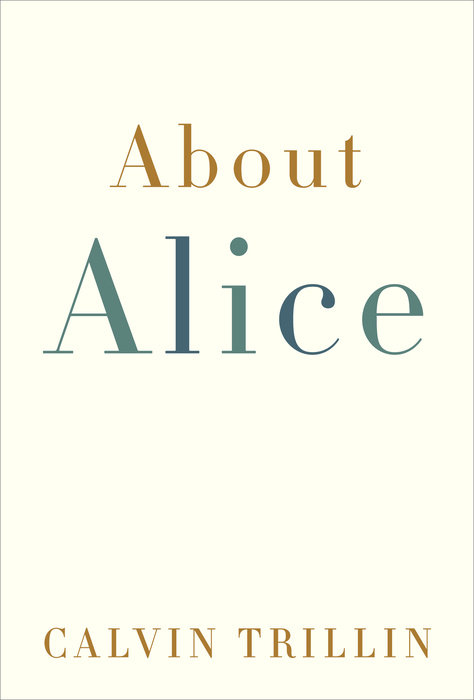Calvin Trillin is not easy to sum up as an author; the good ones never are. His articles in The New Yorker and The Nation, as well as his books and poetry, range from the political to the humorous, from poignantly reflective to deeply sentimental. Naturally, all of his work is a tapestry of these qualities and more.
He might be known best for Alice, Let’s Eat, in which he chronicles travel adventures with his wife and two girls. Even great writers are lucky to have one tour de force in them. About Alice, an ode to his late wife, is surely Trillin’s masterpiece.
I called up my sister in the middle of reading About Alice. “I have to read you something,” I said. “It’s going to make you sob.”
“Boy, are you pregnant,” my sister replied. She was right—I was, and as excessively vulnerable to poignant prose as every cliché of pregnancy dictates.
But I checked recently, since I was curious: had I just been hormonal or was Trillin’s ode to his late wife that good? I read the same passage. Lo and behold, it destroyed me. Again.
Trillin explores his wife with both the lightest of touches and the most powerful of microscopes. At one point he chronicles a story about Alice volunteering at a summer camp. The story captures her expansive empathy, clarity of thought, and precise grasp on the things that mattered most in life. (By the way, she called him “Bud,” because his parents had called him “Buddy” when he was small.)
At camp, Alice had a tendency to gravitate toward the child who needed the most help, and L. was one of those. “Last summer, the camper I got closest to, L., was a magical child who was severely disabled,” Alice wrote. “She had two genetic diseases, one which kept her from growing and one which kept her from digesting any food. She had to be fed through a tube at night and she had so much difficulty walking that I drove her around in a golf cart a lot. We both liked that. One day, when we were playing duck-duck-goose, I was sitting behind her and she asked me to hold her mail for her while she took her turn to be chased around the circle. It took her a while to make the circuit, and I had time to see that on top of the pile was a note from her mom. Then I did something truly awful, which I’m reluctant now to reveal. I decided to read the note. I simply had to know what this child’s parents could have done to make her so spectacular, to make her the most optimistic, most enthusiastic, most hopeful human being I had ever encountered. . . . [M]y eyes fell on this sentence: ‘If God had given us all of the children in the world to choose from, L., we would only have chosen you.’ Before L. got back to her place in the circle, I showed the note to Bud, who was sitting next to me. ‘Quick. Read this,’ I whispered. ‘It’s the secret of life.’”
Damn it. Again. It isn’t easy to see my keyboard when my eyes are clouded with tears. Give me a minute.
Okay, thanks.
Trillin performs a neat trick in this book. It’s called About Alice, but it’s also by Alice. She wrote about fifty percent of it, because so much of it is quotations. I’m not sure there is a greater testament to love and adoration than a writer giving so much real estate to someone else’s words. Of course, when you were married to someone whose facility with and flair for language was as majestic as Alice Trillin’s, you’d be foolish to pass up the chance to fill your book with her words.
About Alice is about Alice, but it is also about a marriage. Every now and then a writer has a chance to document finding a needle in a haystack: the perfect mate. Whenever we have a chance to etch a happy history into stone, we should take it.
I live in Manhattan, and one of my favorite things about Central Park is the love notes. If you’ve ever sat on a Central Park bench, you’ve most likely leaned against a small metal card affixed to the wood. There’s a row of these benches right behind the Met—an area that seems reserved for the finest poetry. Each tiny plaque seems to top the last; so heartfelt and concise, so brave and indelible under snow and rain. One day, though, I found one that was better than the rest. What a relief to have to hunt no farther, not unlike the relief one feels at finding a soul mate.
“Nina,” the plaque read. “How Lucky Are We?”
About Alice is a trim seventy-eight pages but, despite its brevity, it is a dense read, packed with emotion and humor. With each sentence, Trillin seems to write: “Alice, how lucky are we?”
Trillin’s love note to his wife has that quality which defines great art. It doesn’t seem to have been written but instead plucked from the universe like a mathematical equation. It seems to have been there always, inevitable and perfectly true—true as in fact and true as in loyalty.
Do you want to know about Alice Trillin? Do you want to read about someone you wish you could invite over to advise you on life, literature, morality, and aesthetics because she seems just the sort of person who would have the right answers? Do you want to fall in love with a funny and beautiful woman? Calvin Trillin did just that in 1963, and, thankfully for us, he did not keep the pleasure of her company all to himself.
Leslie Kendall Dye is an actor and dancer who lives with her husband and daughter in New York City.








